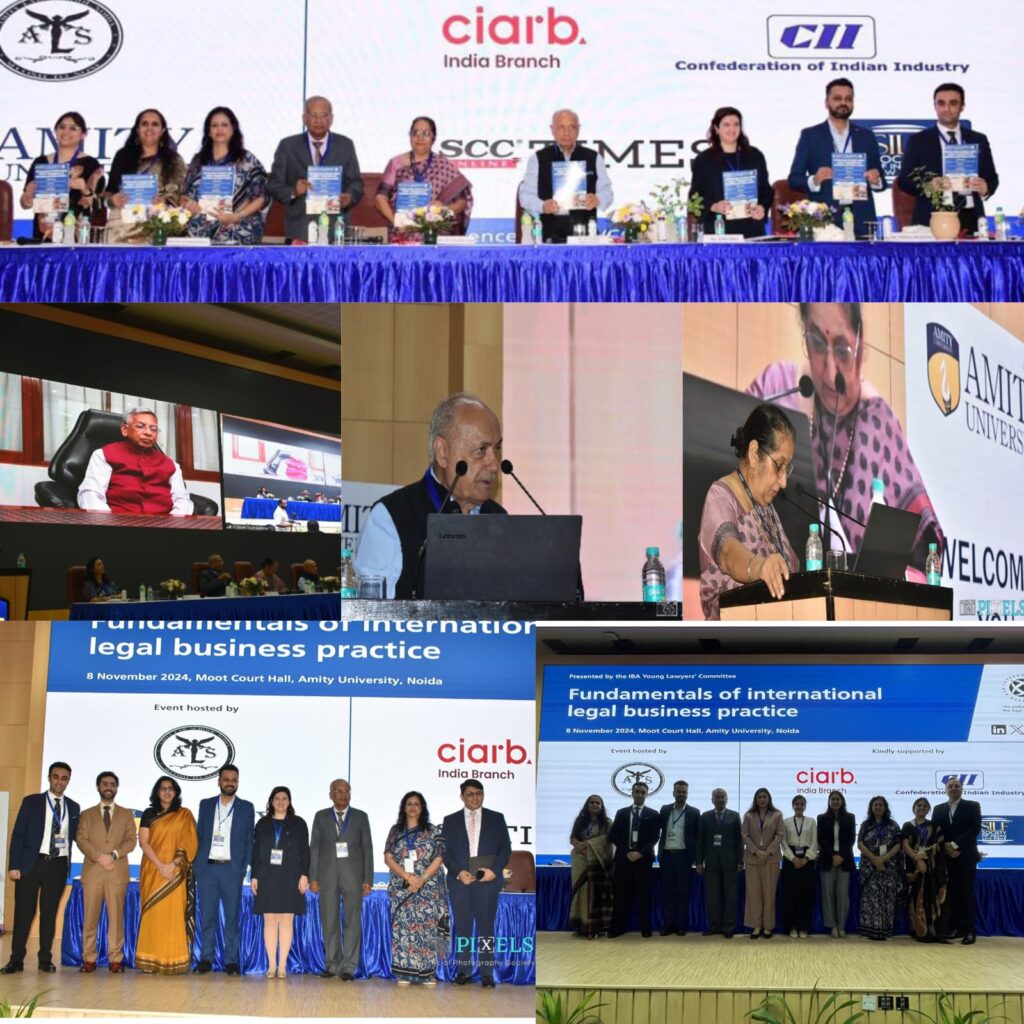Pranav Shukla
On November 8, 2024, the International Bar Association (IBA) conducted a one-day Training Programme on “Fundamentals of International Legal Business Practice”, for legal professionals and students in collaboration with Amity Law School, Noida, Amity University, Uttar Pradesh. This event, which was conducted by the IBA Young Lawyers’ Committee, was the first attributed IBA program in any Indian University, aimed at equipping young lawyers with foundational skills in international law, dispute resolution, and mergers and acquisitions (M&A).
Prof. DK Bandyopadhyay, Chairman, Amity Law School, NOIDA welcomed attendees, expressing gratitude to the IBA for its partnership with Amity University. Mr. Pranav Srivastava, Co-Vice Chair of the IBA Young Lawyers’ Committee and Partner at Phoenix Legal, New Delhi, initiated the training program by emphasizing the importance of bridging theoretical knowledge with real-world international legal practice. He highlighted that adaptability in areas such as cross-border disputes, digital innovation, and regulatory challenges is essential for success in today’s global legal environment. Dr. Lalit Bhasin, President of the Society of Indian Law Firms, and Guest of Honour also addressed the audience, advocating for a commitment to ethical legal practices and underscoring the role of lawyers in promoting justice outside litigation. A recorded message from Chief Guest Shri R. Venkataramani, Attorney General for India, highlighted shifts in the global legal landscape, urging lawyers to focus on the common good across all areas of law.
The Training program was shepherded in three sessions. Session-I was an introduction to the IBA Young Lawyers’ Committee. Moderated by Mr. Arush Khanna, Partner at Numen Law Offices, the first session discussed the role of the IBA Young Lawyers’ Committee in supporting early-career lawyers. Ms. Zeina Obeid, Co-Vice Chair, provided insights into the Committee’s initiatives, which include a mentorship program and the Outstanding Young Lawyer of the Year Award, aimed at encouraging legal excellence and community service. Mr. Srivastava explained the National Representative Program, which offers opportunities for young lawyers to gain exposure within the IBA’s broader organizational structure.
Session-II highlighted the emerging trends in the international arbitration. This session, moderated by Mr. Alipak Banerjee, Head of International Dispute Resolution at Nishith Desai Associates, explored current issues in international arbitration. Ms. Obeid emphasized drafting robust arbitration clauses, advising clarity on matters such as ad hoc versus institutional arbitration, seat selection, and language specification. Dr. Shashwat Bajpai discussed unilateral arbitrator appointments, referencing Indian Oil Corporation Ltd. v. Raja Transport and subsequent amendments in Indian arbitration law, which integrate IBA conflict rules. The panel also covered debates on the “seat versus venue” concept and recent amendments aimed at creating a more arbitration-friendly regime in India. Ms. Neeti Sachdeva, Registrar of the Mumbai Centre for International Arbitration, shared examples of problematic arbitration clauses and highlighted recent legislative proposals, such as the introduction of appellate arbitral tribunals, which could increase caseloads in Indian courts. The session concluded with a discussion on the Group of Companies Doctrine, used to bind non-signatories to arbitration, with reference to the 2024 Supreme Court judgment in Cox & Kings Ltd. v. SAP India (P) Ltd.
Session III was about cross-border mergers and acquisitions (M&A). The final session, moderated by Mr. Sujoy Bhatia, Partner at Chandhiok & Mahajan, focused on the complexities of cross-border M&A. Ms. Tanya Chakraborty, General Counsel at SAMHI Hotels, compared M&A processes to arranged marriages, where initial agreements are followed by rigorous due diligence and legal structuring. Ms. Vani Mehta of GE Aerospace highlighted regulatory hurdles specific to India, such as the role of the Competition Commission of India (CCI) in vetting large transactions and the impact of India’s foreign investment policies. Ms. Kripi Kathuria from Phoenix Legal provided an overview of India’s evolving M&A landscape, noting regulatory oversight by bodies like the Reserve Bank of India and SEBI. The panel also discussed the unique challenges posed by cultural integration in M&A and the potential for AI to streamline processes such as due diligence and post-merger systems integration. The program concluded with a message from Mr. Arush Khanna, who thanked the participants, organizers, and Amity University for hosting. At last, Prof. (Dr.) Shefali Raizada, Director of Amity Law School, NOIDA delivered the vote of thanks.
A souvenir was also released during the Inaugural Session of the Training Program. This Training program was a testament to seamless coordination and meticulous organization, brought to life through the dedicated efforts of IBA members, esteemed dignitaries of Amity University, and the enthusiastic ALSN hosting team inclusive of Dr. Swati Bijawat, Faculty Coordinator, Amity Law School, NOIDA and a dynamic team of student volunteers. The event exemplified a collaborative spirit that ensured an enriching experience for all involved stakeholders in making the same a grand success.

